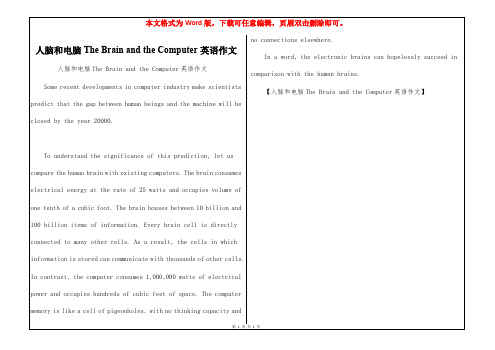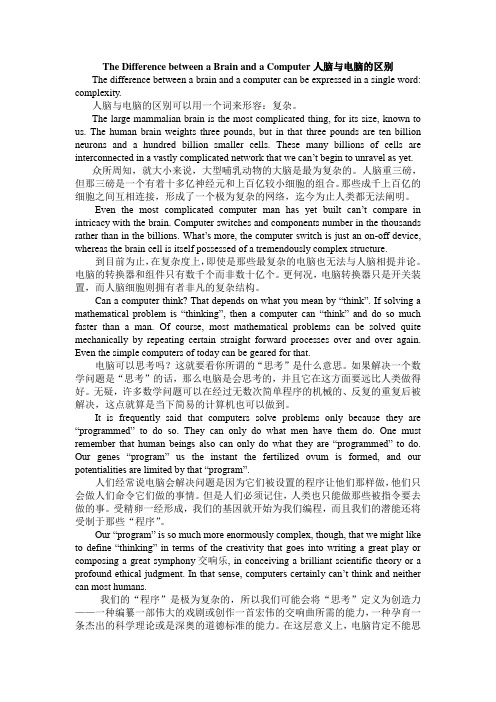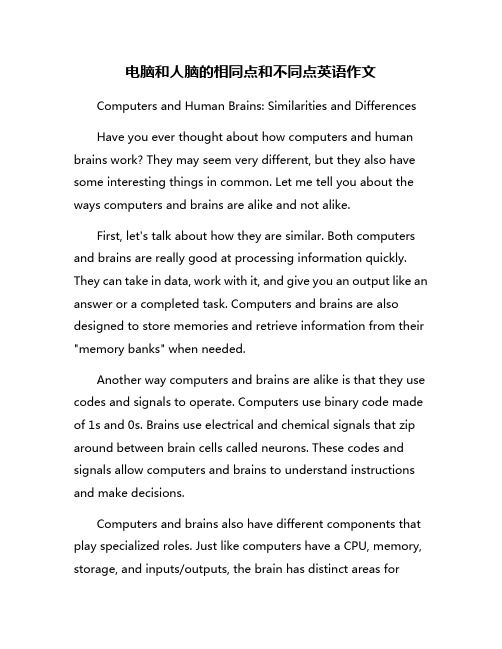人脑与电脑的相似性Similarness Between Brain And Computer.
人脑与计算机计算机科学如何模拟人类大脑的功能

人脑与计算机计算机科学如何模拟人类大脑的功能人脑与计算机:计算机科学如何模拟人类大脑的功能人类大脑作为一种非常复杂的生物器官,一直以来都是计算机科学领域研究的热门话题。
学者们一直试图通过模拟人类大脑的功能来改进计算机的智能水平。
本文将探讨人脑与计算机的相似性、计算机科学模拟人脑功能的方法以及未来的发展方向。
一、人脑与计算机的相似性人脑与计算机之间有着相似的工作原理,因此可以通过计算机模拟人脑的功能。
1. 大脑结构:人脑和计算机都有高度结构化的方式来处理信息。
人脑由大量的神经元组成,每个神经元都与其他神经元连接,形成一个庞大的网络。
类似地,计算机也由许多处理器和内存组成,它们通过电子信号进行信息交流。
2. 信息处理:人脑和计算机都能接收、存储、处理和输出信息。
脑神经元之间的电信号传递信息,在人脑中形成思维和记忆。
而计算机通过输入设备接收信息,通过存储器处理信息,并通过输出设备输出结果。
相似之处使得计算机科学家能够利用人脑的工作原理来模拟人类大脑的功能。
二、计算机科学模拟人脑功能的方法为了模拟人类大脑的功能,计算机科学家尝试了多种方法。
1. 神经网络:神经网络是一种模拟生物神经元工作方式的计算模型。
通过将神经元和它们之间的连接抽象成数学模型,可以模拟人脑的信息处理效果。
神经网络已经被广泛应用于机器学习和深度学习领域,例如人脸识别、语音识别等。
2. 人工智能:人工智能是计算机科学中的一个重要领域,旨在让计算机表现出类似人类智能的行为。
通过构建复杂的算法和模型,可以让计算机像人类一样进行推理、学习和决策。
例如机器学习算法的应用,使计算机根据数据自动调整和改进行为。
3. 脑机接口:脑机接口是将计算机与人类大脑连接,实现人脑与计算机之间的信息交流。
通过测量人脑的信号,如脑电波或脑电图,计算机可以解读人类的意图并提供相应的反馈。
这一技术的发展使得残疾人能够通过思维操控计算机或其他设备。
三、未来的发展方向计算机科学模拟人类大脑的功能仍然处于早期阶段,众多挑战和机遇等待着我们。
人脑与计算机的相似性与差异

人脑与计算机的相似性与差异人类的大脑与计算机是两种不同的信息处理系统,它们各自具有一些相似之处,但也存在着较大的差异。
本文将探讨人脑与计算机之间的相似性和差异,并从信息处理、学习能力和创造力等方面进行比较。
一、信息处理人脑和计算机都能够进行信息的处理和存储。
人脑通过神经元之间的相互连接,在脑内形成复杂的神经网络,从而实现对外界信息的感知、理解和反应。
计算机则通过电子元件的相互作用,将输入的数据进行处理和分析,最终得出结果。
在信息处理方面,人脑和计算机都能够实现类似的功能。
然而,人脑相对于计算机在信息处理上有许多优势。
首先,人脑具有丰富的感知能力,能够通过五官感知到丰富多样的信息,并结合背景知识进行理解。
而计算机虽然可以通过传感器获取环境信息,但其感知能力远远不及人脑。
其次,人脑具有高度的灵活性和适应性,可以根据具体情况调整信息处理的方式和策略。
计算机虽然可以通过编程进行灵活的调整,但仍然需要人类的指令和干预。
因此,人脑在信息处理上相对于计算机更具优势。
二、学习能力学习能力是人类与计算机之间的又一个显著差异。
人脑具有极强的学习能力,能够通过感知、思考和经验积累,改变自身的行为和认知方式。
人类可以通过学习不断掌握新的知识和技能,适应复杂多变的环境。
而计算机的学习能力则需要依赖于人类的编程和算法设计。
尽管人类可以通过程序设计使计算机实现学习,但计算机的学习仍然是一种被动的、依赖于外部指令和数据的过程。
因此,人脑的学习能力要远远超过计算机。
三、创造力创造力是人脑与计算机之间的又一重要差异。
人类具有创造力,能够进行独立思考、创造性的思维和创新性的行动。
人脑可以通过联想、类比和创意思维等方式产生新的想法和解决方案,推动科学、艺术和文化的发展。
而计算机的行为和决策都是基于预设的算法和指令进行的,不存在自主的创造力。
虽然人类可以编写创造性的程序,但这些程序的灵感和创意依然来自于人脑。
因此,创造力是人类独有的能力。
关于人脑和电脑的异同英语作文

关于人脑和电脑的异同英语作文In the age of technological advancement, the comparison between the human brain and computers has becomeincreasingly relevant. Both possess remarkable capabilities that have revolutionized our world, yet they differ significantly in their structure, function, and limitations. This essay aims to delve into the similarities and differences between the human brain and computers,exploring the essence of intelligence in both.**Structure and Physiology**The human brain is a complex organ composed of billions of neurons interconnected by synapses. Its structure is highly organized, with different regions specialized for specific functions such as sensation, motor control, emotion, and cognition. In contrast, computers are made upof silicon chips, transistors, and other electronic components. They lack the biological complexity and organic interconnectedness of the brain.**Processing Speed and Capacity**Computers excel in terms of processing speed and capacity. They can perform millions of calculations per second, store vast amounts of information, and retrieve data almost instantaneously. The human brain, on the other hand, has a limited processing capacity and speed. Itrelies on neural networks and synaptic connections to process information, which is relatively slower compared to computers.**Adaptability and Learning**The human brain demonstrates remarkable adaptability and learning capabilities. It can learn new skills, adapt to changing environments, and make decisions based on past experiences. Computers, although capable of learning through machine learning algorithms, lack the flexibility and adaptability of the human brain. They are limited to the data they are programmed with and cannot exceed the boundaries of their programming.**Emotional Intelligence**The human brain is unique in its ability to experience emotions. It can interpret and respond to emotional cues, understand the feelings of others, and exhibit empathy.Computers, despite their sophistication, lack emotional intelligence. They cannot feel, understand, or respond to emotions in the same way as humans.**Creativity and Imagination**The human brain is capable of extraordinary creativity and imagination. It can generate new ideas, concepts, and art forms that are truly unique and original. Computers, although they can generate combinations and permutations, lack the creative spark and imagination of the human mind. **Conclusion**In conclusion, while the human brain and computers share some commonalities, their differences are profound. The brain's unique structure, adaptability, emotional intelligence, and creativity make it a remarkable organ of intelligence. Computers, on the other hand, excel in terms of speed, capacity, and precision. Understanding the similarities and differences between the two can help us harness their respective strengths and develop more intelligent and empathetic machines.**人脑与电脑的异同:智能本质的探索**随着科技的进步,人脑与电脑的对比变得越来越相关。
人脑和电脑The Brain and the Computer英语作文

no connections elsewhere. In a word, the electronic brains can hopelessly succeed in
comparison with the human brains. 【人脑和电脑 The Brain and the Computer 英语作文】
本文格式为 Word 版,下载可任意编辑,页眉双击删除即可。
人脑和电脑 The Brain and the Computer 英语作文
人脑和电脑 The Brain and the Computer 英语作文 Some recent developments in computer industry make scientists predict that the gap between human beings and the machine will be
closethe significance of this prediction, let us compare the human brain with existing computers. The brain consumes electrical energy at the rate of 25 watts and occupies volume of one tenth of a cubic foot. The brain houses between 10 billion and 100 billion items of information. Every brain cell is directly connected to many other cells. As a result, the cells in which information is stored can communicate with thousands of other cells. In contrast, the computer consumes 1,000,000 watts of electrical power and occupies hundreds of cubic feet of space. The computer memory is like a cell of pigeonholes, with no thinking capacity and
人脑与计算机的比较与相似之处

人脑与计算机的比较与相似之处人类的大脑与计算机是两种截然不同的存在,然而,它们之间也有一些令人惊奇的相似之处。
本文将从信息处理、储存模式和学习能力等角度,对人脑和计算机进行比较,并探讨它们之间的相似性。
一、信息处理能力:人脑和计算机都拥有高效的信息处理能力。
人脑通过神经元的网络传递信息,而计算机则通过电子组件的工作实现。
人脑的信息处理能力是基于神经元之间的连接和传递,每个神经元通过电化学信号与其他神经元相互作用。
同样,计算机的信息处理能力是基于电子元件之间的信号传递和计算。
虽然它们的运行方式不同,但都能高效处理大量的信息。
二、储存模式:人脑和计算机都能够进行信息的储存。
人脑的储存模式是通过神经元之间的连接来实现的,信息以电化学形式在神经元之间传递并被储存。
而计算机则使用硬盘、内存等物理储存设备来存储数据。
尽管储存方式不同,但它们都能够长期保存信息,并在需要时进行读取。
(这里可以适当添加一段)三、学习能力:人脑和计算机都具备学习的能力。
人脑通过经验、观察和记忆来学习新知识和技能。
这种学习能力被称为人类智能。
计算机则通过算法和模型来学习和适应新的任务和情况。
这种学习能力被称为机器学习。
尽管两者的学习方式存在差异,但它们都能根据过去的经验和信息来改变自身,并应对新的情况。
除了上述几个方面的相似之处外,人脑和计算机在某些功能上还存在一定的区别。
首先,人脑具备情感和意识等非常规的能力,而计算机则缺乏这方面的能力,它只能执行程序和算法。
其次,人脑往往能够进行创造性思维和直觉判断,而计算机则很少能够主动产生创新的想法。
此外,人脑的运算速度和适应性也远远超过了计算机。
综上所述,人脑和计算机虽然在结构和功能上存在差异,但也有一些相似之处。
它们都具备高效的信息处理能力、储存信息的模式,以及学习和适应新任务的能力。
然而,人脑在情感、意识和创造性思维方面具备独特的优势,而计算机则在运算速度和大规模数据处理方面具备优势。
人脑与计算机的相似性与差异

人脑与计算机的相似性与差异人类一直在探索宇宙的奥秘,试图更好地理解各种生物和事物的运作规律。
在这个科技高度发达、数字化进程不断加速的时代,人脑与计算机的相似性与差异已经成为了经常被探讨的话题。
人脑与计算机,两者之间的关系是什么样的呢?又有哪些方面相似,哪些方面存在差异呢?相似性一:信息处理能力首先,人脑与计算机最大的相似性就是处理信息的能力。
计算机可以通过运算和算法对数据进行处理,人脑则是通过神经细胞的传递,加上神经网络的联结来处理信息。
两者都可以完成复杂的计算任务,并且都拥有存储和检索数据的能力。
相似的处理能力让人们受益匪浅,比如现代医学中利用计算机进行大型数据分析,优化治疗方案,现代物流中利用计算机运算来规划物流路线,使得成本降低,效率提升等等。
相似性二:提高工作效率其次,人脑和计算机都可以帮助人类提高工作效率。
在工作场合中,人们依赖于计算机来快速完成大量的数据输入、处理和分析,从而提高了工作的效率,减轻了员工的负担,实现更高效的产出。
而人类自身的思考和学习也是通过努力训练和拓展知识面来提高个人的工作效率。
相似性三:形成人工智能除此之外,人脑与计算机的另一个显著相似性就是相互促进开发人工智能的能力。
计算机科学家们一直在努力模拟人类的思维方式,从而为人类生活带来更多便利。
人脑对于人工智能的发展提供了新的思路和灵感,而计算机技术的不断发展也为人工智能的发展提供着源源不断的支持。
差异一:思维方式虽然人脑和计算机有很多相似的地方,但是两者之间还存在着很大的差异。
最大的一点就是思维方式的不同。
计算机程序只能按照任务要求进行计算,而人脑则拥有着自主思考和发散思维的能力。
人类可以思考某个问题的不同方面,进行多方位尝试和创造,而计算机则只能依据程序的指令进行决策。
因此,在某些涉及到抉择、判断和选择的场合,人类的决策和思考能力还是更加优势。
差异二:自我修复能力另外,在存在故障或者损伤的情况下,人脑还有着自我修复的能力,而计算机却不然。
人脑与电脑的区别(The Difference between a Brain and a Computer)

人脑与电脑的区别(The Difference between a Brain and a Computer)hedifferencebetweenabrainandacomputercanbeexpressedinasingleword:c omplexity.eventhemostcomplicatedcomputermanhasyetbuiltcan'tcompare puterswitchesandcomportentsnumberintheth ousandsratherthaninthebillions.what'smore,thecomputerswitchisjustanon-offdevice,whereasthebraincellisitselfpossessedofatremendouslycomplexin nerstructure.canacomputerthink?thatdependsonwhatyoumeanby"think".if solvingamathematicalproblemis"thinking',thenacomputercan"think'anddo somuchfasterthanaman.ofcourse,mostmathematicalproblemscanbesolved quitemechanicallybyrepeatingcertainstraightforwardprocessesoverandove ragain.eventhesimplecomputersoftodaycanbegearedforthat.surely,though, ifacomputercanbemadecomplexenough,itcanbeascreativeasweare.ifitcoul dbemadeascomplexasahumanbrain,itcouldbetheequivalentofahumanbrain anddowhateverahumanbraincando.buthowlongwillittaketobuildacompute rcomplexenoughtoduplicatethehumanbrain?perhapsnotaslongassomethin k.longbeforeweapproachacomputerascomplexasourbrain,wewillperhapsbu ildacomputerthatisatleastcomplexenoughtodesignanothercomputermorec omplexthanitself.thismorecomplexcomputercoulddesignonestillmorecomp lexandsoonandsoonandsoon.inotherwords,oncewepassacertaincriticalpoin t,thecomputerstakeoverandthereisa"complexityexplosion".inaveryshorttimethereafter,computersmayexistthatnotonlyduplicatethehumanbrain--butfarsurpassit.人脑与电脑的区别”英语作文译文:要形容人脑与电脑的区别只需一个词,即:复杂。
人脑与计算机的相似性与差异性

人脑与计算机的相似性与差异性在人类历史上,人脑和计算机都是两个极为重要的存在。
人脑是人类思维和意识的基础,而计算机则是现代科技的核心。
虽然二者具有一些相似之处,但也存在着明显的差异。
本文将探讨人脑与计算机在结构、功能和智能等方面的相似性与差异性。
一、结构上的相似性与差异性从结构上看,人脑和计算机都由不同的组成部分构成。
人脑由数以亿计的神经元组成,这些神经元通过突触进行信息传递。
而计算机则由中央处理器(CPU)、内存、硬盘等部件组成,通过电信号进行计算和存储。
虽然人脑和计算机的结构不同,但二者都能完成信息的处理和存储。
人脑通过神经元之间的连接关系,实现了庞大的神经网络,可以进行复杂的思维活动。
而计算机则利用处理器和内存的协同工作,通过算法和程序来处理和存储信息。
二、功能上的相似性与差异性人脑和计算机在功能上也存在一些相似和差异。
人脑通过感知、思维、记忆等功能,实现了精准而复杂的思维活动。
而计算机则通过计算、存储、检索等功能,实现了高效的数据处理。
不同之处在于,人脑具有自主学习和适应能力。
通过学习和经验积累,人脑能够不断适应环境变化并改善自身能力。
而计算机则需要人类编写程序来实现特定的功能,缺乏自主学习和适应能力。
另外,人脑还具备情感和意识等高级功能,这是计算机所不具备的。
虽然计算机可以通过算法和模拟实现一定的智能,但仍然无法拥有情感和意识。
三、智能上的相似性与差异性智能是人脑和计算机的重要区别之一。
人脑具有高度发达的智能,可以进行识别、推理、创造等复杂的思维活动。
而计算机的智能则是基于编程和算法来实现的,虽然可以进行一些自动化的推理和决策,但仍然无法与人脑相比。
在人工智能领域,科学家们致力于研发能够模拟人脑智能的计算机系统。
深度学习和神经网络等技术的发展,使得计算机的智能水平不断提升,但仍然无法达到人类智能的复杂程度。
结论综上所述,人脑与计算机在结构、功能和智能等方面存在相似性和差异性。
尽管计算机在处理速度和存储容量上具有优势,但人脑在学习能力、情感和意识等方面具有独特的优势。
关于人脑和电脑的异同英语作文

关于人脑和电脑的异同英语作文The Similarities and Differences between the Human Brain and Computers.In the modern era of technological advancements, the human brain and computers have become inextricably linked. While they serve different purposes and operate on distinct principles, there are surprising parallels between the two. This essay delves into the similarities and differences between the human brain and computers, exploring their respective functions, capabilities, and limitations.Similarities.1. Processing Information: Both the human brain and computers are information processing systems. The brain processes incoming sensory information, interprets it, and generates responses. Similarly, computers receive, store, manipulate, and output data based on programmed instructions.2. Storage Capacity: Both the brain and computers have the ability to store vast amounts of information. The brain stores memories, knowledge, and skills through synaptic connections, while computers rely on hard drives, solid-state drives, and other storage devices to retain data.3. Pattern Recognition: Both the brain and computers can recognize patterns. The brain does this instinctively, allowing us to recognize faces, places, and objects. Computers, through machine learning algorithms, can also identify patterns in data, enabling them to perform tasks like image recognition and predictive analysis.4. Adaptive Capability: Both the brain and computers have the ability to adapt and learn. The brain's neural networks change and reorganize themselves in response to new experiences and information, a process known as neuroplasticity. Similarly, computers can be programmed to learn from data and improve their performance through techniques like artificial neural networks and deep learning.Differences.1. Biological vs. Technological Origin: The most fundamental difference between the brain and computers is their origin. The brain is a biological organ, evolved through millions of years of natural selection, while computers are technological creations, designed and built by humans.2. Speed and Efficiency: Computers process information much faster than the human brain. They can execute billions of instructions per second, whereas the brain's processing speed is limited by its biological constraints. However, the brain's efficiency lies in its ability to integrate information from multiple senses and make complex decisions quickly.3. Creativity and Emotion: The human brain is unique in its ability to generate creativity and experience emotions. Computers, while capable of generating art and music, lack the emotional intelligence and subjective experience thathumans possess. They operate based on logic and programmed instructions, whereas the brain integrates emotional and rational processes to form unique thoughts and perspectives.4. Energy Consumption: Computers consume large amountsof energy to function, while the brain operates efficiently on a relatively small amount of glucose. The brain'sability to conserve energy while performing complex tasksis one of its remarkable features.5. Scalability: Computers can be easily scaled up or down in terms of their processing power, storage capacity, and other specifications. The brain, however, has limited scalability. While it can adapt to changes in the environment and learn new skills throughout life, its fundamental structure and capabilities are fixed at birth.In conclusion, while the human brain and computersshare some fundamental similarities in terms of information processing and storage, they differ significantly in their origin, speed, efficiency, creativity, emotion, energy consumption, and scalability. Understanding thesedifferences is crucial in harnessing the potential of both the brain and technology to create a more harmonious and productive future.。
The Difference between a Brain and a Computer人脑与电脑的区别

The Difference between a Brain and a Computer人脑与电脑的区别The difference between a brain and a computer can be expressed in a single word: complexity.人脑与电脑的区别可以用一个词来形容:复杂。
The large mammalian brain is the most complicated thing, for its size, known to us. The human brain weights three pounds, but in that three pounds are ten billion neurons and a hundred billion smaller cells. These many billions of cells are interconnected in a vastly complicated network that we can’t begin to unravel as yet.众所周知,就大小来说,大型哺乳动物的大脑是最为复杂的。
人脑重三磅,但那三磅是一个有着十多亿神经元和上百亿较小细胞的组合。
那些成千上百亿的细胞之间互相连接,形成了一个极为复杂的网络,迄今为止人类都无法阐明。
Even the most complicated computer man has yet built can’t compare in intricacy with the brain. Computer switches and components number in the thousands rather than in the billions. What’s more, the computer switch is just an on-off device, whereas the brain cell is itself possessed of a tremendously complex structure.到目前为止,在复杂度上,即使是那些最复杂的电脑也无法与人脑相提并论。
人脑与电脑的相似与差异

人脑与电脑的相似与差异
首先,人脑是自然界进化的产物,是生物性质的,而电脑是人脑设计的产物,不是生物性质的。
其次,人脑可以自然产生思想,感情,思维等心理过程,同时兼备个性倾向性(性格等)。
人脑产生的智慧和思想是无限的。
而电脑离不开事先设定的程序,程序里没有的不会自觉产生。
没有程序,电脑只是一些电子元件。
更不要说自我学习,观察,理解,感情,性格等这些高等功能了。
而人脑与电脑很相似。
电脑分硬盘和内存,长期不用的文件保存在硬盘上,临时处理的文件占用的是内存;而人脑也分硬盘和内存,长期记忆的知识、事情也都保存在大脑的硬盘里,当人思考问题时,人的记忆力的好坏以及反应速度的快慢基本取决与大脑的内存大小,记忆力好的、反应速度快的大脑内存大,反之内存小。
电脑内存大的好处就是快速的处理各种文件,若是让小内存的电脑处理大量的文件,很快会造成死机;人脑也一样,比如做数学题,反应快的人按其正常速度在十分钟内做了十道题,而反应慢的人按其正常的做题速度做完十道题则需要15分钟,若让反应慢的人提高做题速度,头几道题他可能会较快的做完,但他的大脑却很快变得混乱或发热,失去了之前那种冷静思考问题的状态,直至无法继续思考,可以把这种情况称为死机,若要继续思考就得先休息一下大脑。
因此,有的人脑内存大,记忆力好,反应快,且能够长时间快速的使用;有的人脑内存小,记忆力差,反应慢,只能长时间慢速度的工作,若人为得提高速度,很快会导致死机——
头脑发热、混乱。
人脑与计算机的相似性与差异

人脑与计算机的相似性与差异人脑和计算机是两种完全不同的存在,但它们之间确实存在相似性与差异。
人脑是自然界最精密复杂的神经系统之一,是人类思维和行为的基础,而计算机是人类创造出来的工具,用于处理信息和执行任务。
在以下几个方面,我们可以看到人脑与计算机的相似性与差异。
一、信息处理方式人脑与计算机在信息处理方式上存在相似性与差异。
人脑通过神经元之间的电信号传递和神经细胞之间的化学物质传递来处理信息。
神经元通过网络连接起来,形成复杂的神经回路,并通过突触间的连接传递信息。
这使得人脑具备了并行处理信息的能力,能够同时进行多个任务。
而计算机则通过中央处理器(CPU)来执行指令,采用串行的方式处理信息。
计算机在时钟脉冲的驱动下,每个时钟周期只能处理一个指令,所以计算机只能逐个执行任务,无法像人脑那样并行处理多个任务。
二、存储方式人脑和计算机在存储方式上也存在着相似性与差异。
人脑通过神经元之间的连接和突触之间的强化或削弱来存储信息。
这种存储方式被称为“可塑性”,即人脑的连接和突触可以通过学习和经验的积累来改变。
而计算机则使用内存(RAM)和硬盘(HDD)来存储数据。
内存是用于临时存储数据和程序的高速运行空间,而硬盘则用于长期存储数据。
计算机的存储方式相对静态,只有在用户的指令下才能改变存储内容。
三、处理速度人脑与计算机在处理速度上存在明显的差异。
人脑具有惊人的计算和处理速度,能够快速地做出反应和决策。
人脑的处理速度取决于神经元之间的连接和传递速度,但同时也受到认知和思维能力的限制。
相比之下,计算机的处理速度更快。
计算机的运算速度受到处理器性能和内存容量的影响,而随着科技的发展,计算机的处理速度越来越快,可以在短时间内完成大量的计算和任务。
四、创造力与情感人脑与计算机在创造力和情感上存在巨大差异。
人脑能够进行抽象思维、创造性思维和情感体验,具备丰富的情感和意识。
人类的创造力和想象力是无法用计算机来比拟的。
计算机虽然能够进行复杂的计算和逻辑推理,但是缺乏创造力和情感。
人脑与计算机的相似性与差异

人脑与计算机的相似性与差异人类一直以来对人脑和计算机的比较充满兴趣,因为这两者都在信息处理方面有着重要的作用。
虽然人脑和计算机在某些方面具有相似性,但它们也存在着显著的差异。
本文将探讨人脑与计算机之间的相似性与差异,帮助我们更好地了解人类智能和计算机技术的本质。
一、相似性1.信息处理能力人脑和计算机都具备信息处理的能力。
人脑通过神经元之间的传递信号来处理和存储信息,计算机则通过集成的电子元件执行数字计算和逻辑操作。
无论是人脑还是计算机,都能够接收、处理和储存大量的信息。
2.逻辑思维人类的思维过程和计算机执行逻辑操作有着相似之处。
无论是解决问题、推理还是制定计划,人类都需要运用逻辑思维。
而计算机正是通过逻辑电路和算法来进行计算和决策。
3.学习能力人类和计算机都具备学习的能力。
人类通过观察、实践和经验积累来学习新知识和技能。
而计算机则通过机器学习算法和人工智能技术来模拟人类的学习行为,不断优化算法和提高学习效果。
二、差异1.处理速度计算机的处理速度远远超过人类的大脑。
计算机能够以每秒数十亿次甚至更快的速度进行计算和处理,而人类的大脑在信息处理上远远落后。
这也是计算机能够在较短时间内完成复杂计算和处理任务的原因之一。
2.存储容量计算机的存储容量远远超过人类大脑。
人脑的容量有限,虽然无法精确计算,但据估算,人类大脑的存储容量约为2.5PB。
而计算机的存储容量可以达到数EB甚至更大。
这使得计算机能够存储并处理更多的数据和信息。
3.智能和情感人脑具备智能和情感,而计算机则缺乏。
人类的智能包括创造力、推理能力、直觉等,而这些都是计算机目前所不能具备的。
此外,人类还能够体验情感,如愉悦、悲伤、愤怒等,而计算机只能通过算法模拟情感,无法真正理解和表达情感。
结论人脑和计算机在信息处理能力、逻辑思维和学习能力方面存在相似性,都是信息处理和分析的重要工具。
然而,计算机的处理速度和存储容量远远超过人类大脑,但计算机缺乏人类的智能和情感。
电脑和人脑的相同点和不同点英语作文

电脑和人脑的相同点和不同点英语作文Computers and Human Brains: Similarities and DifferencesHave you ever thought about how computers and human brains work? They may seem very different, but they also have some interesting things in common. Let me tell you about the ways computers and brains are alike and not alike.First, let's talk about how they are similar. Both computers and brains are really good at processing information quickly. They can take in data, work with it, and give you an output like an answer or a completed task. Computers and brains are also designed to store memories and retrieve information from their "memory banks" when needed.Another way computers and brains are alike is that they use codes and signals to operate. Computers use binary code made of 1s and 0s. Brains use electrical and chemical signals that zip around between brain cells called neurons. These codes and signals allow computers and brains to understand instructions and make decisions.Computers and brains also have different components that play specialized roles. Just like computers have a CPU, memory, storage, and inputs/outputs, the brain has distinct areas forthings like movement, vision, language, and learning/memory. Each part has an important job to do.While there are some cool similarities, there are also many ways computers and brains differ. One big difference is that computers are human-made machines, but brains are natural, biological organs that are part of a living being's body. Brains grew and developed over millions of years through evolution. Computers are invented technology that have only existed for a relatively short period of time.Brains are also way more complex, flexible and advanced than even the most powerful computers today. The human brain has about 86 billion neurons that can make trillions of connections called synapses. Computer circuits are much more simple in comparison. Brains can do amazing things like learn from experiences, think creatively, feel emotions, and beself-aware. Computers can only operate based on the code programmed by human engineers. brains require food, water, sleep and oxygen to keep functioning well. Computers just need an electricity source to run. If a computer breaks or has damaged hardware, you may be able to repair or replace the broken components. But if major parts of a brain are injured, it can bepermanent and devastating since brain cells don't regenerate as easily.Our brains also control so many automatic functions in our bodies like breathing, digesting food and keeping our heart beating. Computers don't have to worry about any of those biological processes. Computers need us to give them information and instructions while our brains can gather information through our five senses all on their own.Another key difference is that human brains have consciousness and free will. Computers are just machines that can only do what they are programmed to do. Computers don't have an inner experience of awareness and can't make their own choices and decisions based on desires or beliefs. People use their consciousness to control their thoughts and actions.While computers are great at calculation, memorization, and data processing, human brains are much better at imagination, creativity, and things that require human cognition and reasoning skills. For example, writing a story or painting a picture requires brain skills that would be incredibly difficult, maybe even impossible, to program into a computer.So in summary, while computers and brains both deal with information in the form of codes and signals, the human brain isa marvelous, living organ that far surpasses current technology in its complexity and capabilities. Maybe computers will become smarter and more brain-like someday. But for now, our brains are unique, extraordinary machines found nowhere else but inside the human body.I hope this essay helped explain some of the key similarities and differences between computers and human brains. Even though I'm just a kid, it's amazing to learn about and appreciate the incredible computing power within our own heads! Let me know if you have any other questions.。
人脑与计算机的相似之处

人脑与计算机的相似之处人类自古以来就一直对自己的大脑如何运作感到好奇。
而如今,随着计算机科学的迅猛发展,我们开始注意到人脑与计算机之间存在很多有趣的相似之处。
本文将探讨人脑与计算机的相似之处,从而进一步理解大脑的工作原理。
一、信息处理能力人脑和计算机都具有强大的信息处理能力。
计算机能够以极快的速度处理海量数据,并进行复杂的运算和逻辑推理。
同样,人脑也能够快速获取、存储和分析大量信息,并做出相应的决策和反应。
这种类比的相似性使得人脑和计算机都成为人工智能和机器学习领域的研究重点。
二、存储器件计算机的存储器件是其重要组成部分之一。
人脑也有一种类似的存储器件——记忆。
人类通过大脑中的神经元网络将信息存储在脑细胞之间的连接中。
类似地,计算机通过硬盘、内存和其他存储设备来保存和检索数据。
虽然存储方式不同,但都能实现信息的长期保存和快速访问。
三、逻辑运算计算机以二进制形式进行逻辑运算,通过与、或、非等运算符来实现复杂的逻辑推理。
人脑在进行决策和思考时也会使用逻辑运算。
虽然人类的逻辑能力可能不如计算机精确,但我们也能够进行逻辑推理,进行因果分析和问题解决。
四、学习与适应能力人脑与计算机都具有学习和适应的能力。
计算机通过机器学习和深度学习算法不断优化自身性能,提高识别和分析能力。
类似地,人类通过学习和经验积累不断改进自己的认知和思维方式。
我们可以适应新环境,习得新技能,并在不断变化的世界中不断进步。
五、信息传递与交流计算机通过网络和其他设备进行信息传递和交流,实现远程通信和协同工作。
人脑也能够通过语言、手势、表情等方式与他人进行交流和分享信息。
这种信息传递和交流的相似性使得人脑和计算机互为补充,共同推动了人类社会的发展。
六、错误容忍能力无论是人脑还是计算机,在信息处理过程中都有可能出现错误。
然而,人脑具有一定的纠错和容忍能力,可以通过反馈机制和自我修复来纠正错误。
计算机也可以通过算法和错误检测机制来改正错误。
这种错误容忍能力使得人脑和计算机都能在面对挑战和困难时保持韧性,并寻找解决问题的方法。
人脑与计算机物理相似性的讨论

人脑与计算机物理相似性的讨论人脑和计算机,是两种截然不同的物理系统。
人脑是生物体内部的一个器官,是由众多神经元和突触相互连接构成的信号处理系统。
计算机则是由大量的电子器件组成的电路逻辑系统。
尽管人和计算机之间存在这样的巨大差异,但人们仍在思考,人脑和计算机之间是否存在相似性。
人脑和计算机的相似性可以从多个方面进行分析。
首先,人脑和计算机都是处理信息的系统。
人脑通过神经元和突触的相互连接,把信息从感官传递到大脑中心,进行信号处理,分析判断并作出响应。
计算机通过电路逻辑处理器和存储器,把信息从外设传递到计算机中心,进行数学计算和逻辑判断,并输出响应。
就信息处理而言,人脑和计算机都具有相似性。
其次,人脑和计算机都拥有突出的计算能力。
人脑在大脑皮层中,有着惊人的计算能力和信息处理能力。
这使得人脑能够快速地分析复杂的信息,比如语言、声音、图像等。
计算机也有着强大的计算能力,其处理速度和存储能力越来越强,甚至可以处理比人脑更复杂的信息,比如语音识别,人脸识别等。
在计算能力方面,人脑和计算机也具备了很多的相似性。
第三,人脑和计算机都具有自我学习和自适应的能力。
人脑既可以通过基因遗传来获得一些原始的行为模式,也可以通过学习来适应复杂的环境和任务。
计算机也可以通过机器学习和人工智能等技术来实现自我学习和自适应。
在这方面,人脑和计算机的相似性又表现得十分明显。
人类的大脑和计算机虽然有许多相似之处,但两者之间也有着重大的区别。
人脑拥有着比计算机更加优秀的知识存储和组合能力。
人脑中的大量神经元之上,还存在着大量的神经回路和高级结构的连接关系。
这种连接关系具有很高的可塑性和自适应性,可以用来对信息进行处理和存储。
这是计算机还无法具备的。
而计算机虽然的计算能力强大,但也存在着一些局限性。
计算机的逻辑思考能力仅限于已有的信息和编程逻辑,难以从感性和非逻辑的信息获取启发。
而人脑则可以通过感性认知的方式享有瞬间收获的乐趣,进行对各种信息的处理和理解。
人类大脑与计算机的共性与差异

人类大脑与计算机的共性与差异随着科技的进步,人们对计算机的认识越来越深刻,而对人类大脑的解密也在逐步进行。
人类大脑和计算机有许多共性和差异,这对于我们深入理解大脑和计算机的运作原理非常重要。
一、共性人类大脑和计算机的共性在于它们都能够进行信息处理。
对于计算机来说,信息处理是通过输入、处理、输出的方式实现的。
而对于人类大脑来说,这种信息处理是通过神经元之间的相互作用来实现的。
从这个意义上说,人类大脑和计算机都是信息处理系统。
此外,人类大脑和计算机的信息处理都是基于电信号的传递来实现的。
在计算机中,电信号在电路中传递,从而实现信息的处理。
而在人类大脑中,电信号同样在神经元之间传递,从而实现思维和感觉等各种功能。
二、差异虽然人类大脑和计算机存在一些共性,但是它们之间也存在着很多不同之处。
首先,人类大脑具有更高的自适应性和自组织性。
它可以通过调整神经元之间的连接来适应不同的环境和思维任务。
而计算机在进行数据处理时,需要提前设计好算法和程序,才能完成计算任务。
其次,人类大脑具有更高的智能性和灵活性。
人类大脑能够完成非常复杂的思维任务,如推理、判断、创新等。
这是因为人类大脑具有丰富的经验和知识储备,能够在不同的情境下迅速做出决策。
而计算机只能完成早已设定好的任务,缺乏感性和创造力。
再次,人类大脑的运作速度很慢。
虽然人类大脑可以完成非常复杂的思维任务,但是它的运作速度远远不如计算机。
计算机的运算速度可以达到GHz级别,而人类大脑的运作速度只有几百Hz 的水平。
最后,人类大脑和计算机的存储方式也不同。
人类大脑的记忆储存是通过神经元之间的连接来实现的,因此可以实现无限扩展,但是只能存储相对较为固定的信息。
而计算机的存储方式是通过硬盘、内存等介质实现的,容量非常大,但是需要进行文件、目录等管理。
三、共同点的启示尽管人类大脑和计算机在很多方面存在差异,但是它们之间的一些共性可以启发人们设计更为高效、自适应、灵活的计算机系统。
人脑模拟计算机的智能复制

人脑模拟计算机的智能复制近年来,随着科技的不断进步和人工智能的快速发展,人类对于将人脑智能复制到计算机中的想象也变得更加具体和现实。
人脑模拟计算机(Human Brain Emulation)作为一种前沿的科技研究领域,被视为未来人工智能发展的重要方向之一。
这项技术的核心目标是将人类大脑的结构和功能等复杂特征完全还原到计算机上,实现对人脑智能的精确模拟及复制。
一、人脑智能与计算机智能的相似性人脑是一种自适应、高度复杂的系统,拥有丰富的神经元网络和大量的突触连接。
计算机智能则是基于算法和数据的逻辑判断和计算能力。
尽管二者在形式上存在很大差异,但在某些层面上,人脑智能与计算机智能之间存在一定的相似性。
首先,人类的思维、认知和学习过程是基于神经元之间的复杂连接和电信号传递。
同样,计算机的运算和逻辑推理也是通过电子信号在硬件之间的传输和处理来完成。
因此,人类和计算机都可以被视为信息处理系统,存在某种程度的相似性。
其次,人脑的智能来源于大量的经验积累和学习,而计算机的智能则取决于其所接触到的数据和算法。
无论是人脑还是计算机,都可以通过不断学习和积累知识来提升智能水平。
这种相似性为人脑模拟计算机的智能复制提供了基础。
二、人脑模拟计算机的意义与挑战人脑模拟计算机对于人工智能领域具有重要意义和挑战。
首先,通过模拟人脑,可以更好地理解人类智能的本质。
人类大脑作为智能的源泉,其机制和特点一直是科学家们争论的焦点。
通过人脑模拟计算机,可以深入研究人脑活动、认知能力以及智能行为背后的原理和机制,进一步探索人类思维的奥秘。
其次,人脑模拟计算机有助于推动人工智能的发展。
通过将人脑智能复制到计算机中,可以为机器赋予更强大的智能能力,提高机器在感知、决策和自主学习等方面的能力。
这有望在医疗、金融、交通等领域带来革命性的变革,为人类社会带来更多便利和效益。
然而,人脑模拟计算机也面临着很多挑战。
首先,人脑的结构复杂而庞大,对于计算机的硬件和算法提出了很高的要求。
- 1、下载文档前请自行甄别文档内容的完整性,平台不提供额外的编辑、内容补充、找答案等附加服务。
- 2、"仅部分预览"的文档,不可在线预览部分如存在完整性等问题,可反馈申请退款(可完整预览的文档不适用该条件!)。
- 3、如文档侵犯您的权益,请联系客服反馈,我们会尽快为您处理(人工客服工作时间:9:00-18:30)。
Similarness Between Brain And Computer
Brain and computer are very similary in much appearance.
The first, all of the impulses are in the same, not only the computer but also the brain. The impulses of the both are digital. It is said that all the impulses are in the same of the height, or the time last. Samely have the property of " whole or none ". They samely rely on frequency coding information.
Secondly,the information handling procss of person brain and computer have the certain function of ideological association, rely on plenty of impulses to produce association, serially and parallelly handling information.
3th, the person brain and computer rely on electronic signal to handl all kinds of information.
4th, person brain and computer also produce electromagnetic field signal. It had been taken over probably that this signal has ideological information to carry stealing criminal possibility.
5th, person brain and computer stocking information with the form of cluster , have link information between each cluster.
6th , person brain and computer stock information in zones, some information is repeated. Computer has logic zone, person brain has cerebrum, cerebellum, left brain and right brain, etc.
7th,the person brain and the computer store information according to different form, have different operation and presence way.
人脑和电脑有许多共同点。
首先,人的神经脉冲信号与计算机数字信号一样都是数字化的,每个脉冲都一样的幅度,一样的频率,一样依靠频数来编码信息,一样有着“全或无”的特性。
其次,人脑与电脑的信息处理方面都有着一定的联想功能,都依赖于大量的信息组合产生联想,都有着串行和并行处理信息的能力。
第三、人脑与电脑都依靠电子信号处理和存储信息。
第四、人脑与电脑都能够产生电磁场的发放信号。
这个信号都有可能被接收,从而有思想窃听和信息窃取犯罪的可能。
第五、人脑与电脑都以簇的形式存储信息,各簇之间有链接信息。
第六、人脑与电脑都分区存储信息,某些信息是重复的。
电脑有逻辑分区,人脑有大脑、小脑、左脑、右脑等。
第七、人脑与电脑都按照不同的格式储存信息,不同性质的信息有不同的运行和存在方式。
